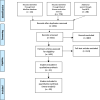Behavioural Change Techniques in Health Coaching-Based Interventions for Type 2 Diabetes: A Systematic Review and Meta-Analysis
- PMID: 36639632
- PMCID: PMC9837922
- DOI: 10.1186/s12889-022-14874-3
Behavioural Change Techniques in Health Coaching-Based Interventions for Type 2 Diabetes: A Systematic Review and Meta-Analysis
Abstract
Background: Given the high rates globally of Type 2 Diabetes Mellitus (T2DM), there is a clear need to target health behaviours through person-centred interventions. Health coaching is one strategy that has been widely recognised as a tool to foster positive behaviour change. However, it has been used inconsistently and has produced mixed results. This systematic review sought to explore the use of behaviour change techniques (BCTs) in health coaching interventions and identify which BCTs are linked with increased effectiveness in relation to HbA1C reductions.
Methods: In line with the PICO framework, the review focused on people with T2DM, who received health coaching and were compared with a usual care or active control group on HbA1c levels. Studies were systematically identified through different databases including Medline, Web of science, and PsycINFO searches for relevant randomised controlled trials (RCTs) in papers published between January 1950 and April 2022. The Cochrane collaboration tool was used to evaluate the quality of the studies. Included papers were screened on the reported use of BCTs based on the BCT taxonomy. The effect sizes obtained in included interventions were assessed by using Cohen's d and meta-analysis was used to estimate sample-weighted average effect sizes (Hedges' g).
Results: Twenty RCTs with a total sample size of 3222 were identified. Random effects meta-analysis estimated a small-sized statistically significant effect of health coaching interventions on HbA1c reduction (g+ = 0.29, 95% CI: 0.18 to 0.40). A clinically significant HbA1c decrease of ≥5 mmol/mol was seen in eight studies. Twenty-three unique BCTs were identified in the reported interventions, with a mean of 4.5 (SD = 2.4) BCTs used in each study. Of these, Goal setting (behaviour) and Problem solving were the most frequently identified BCTs. The number of BCTs used was not related to intervention effectiveness. In addition, there was little evidence to link the use of specific BCTs to larger reductions in HbA1c across the studies included in the review; instead, the use of Credible source and Social reward in interventions were associated with smaller reductions in HbA1c.
Conclusion: A relatively small number of BCTs have been used in RCTs of health coaching interventions for T2DM. Inadequate, imprecise descriptions of interventions and the lack of theory were the main limitations of the studies included in this review. Moreover, other possible BCTs directly related to the theoretical underpinnings of health coaching were absent. It is recommended that key BCTs are identified at an early stage of intervention development, although further research is needed to examine the most effective BCTs to use in health coaching interventions.
Trial registration: https://www.crd.york.ac.uk/prospero/display_record.php?ID=CRD42021228567 .
Keywords: Behaviour change techniques; Health behaviour change; Health coaching; Self-management; Type 2 diabetes.
© 2023. The Author(s).
Conflict of interest statement
The other authors have no conflicts of interest.
Figures
Similar articles
-
Effective behavioral change techniques in m-health app supported interventions for glycemic control among patients with type 2 diabetes: A meta-analysis and meta-regression analysis of randomized controlled trials.Digit Health. 2025 Mar 13;11:20552076251326126. doi: 10.1177/20552076251326126. eCollection 2025 Jan-Dec. Digit Health. 2025. PMID: 40093696 Free PMC article. Review.
-
Effectiveness of behavioral change techniques employed in eHealth interventions designed to improve glycemic control in persons with poorly controlled type 2 diabetes: a systematic review and meta-analysis protocol.Syst Rev. 2017 Oct 24;6(1):211. doi: 10.1186/s13643-017-0609-1. Syst Rev. 2017. PMID: 29065911 Free PMC article.
-
Psychological interventions to improve self-management of type 1 and type 2 diabetes: a systematic review.Health Technol Assess. 2020 Jun;24(28):1-232. doi: 10.3310/hta24280. Health Technol Assess. 2020. PMID: 32568666 Free PMC article.
-
Psychological interventions for improving adherence to inhaled therapies in people with cystic fibrosis.Cochrane Database Syst Rev. 2023 Mar 29;3(3):CD013766. doi: 10.1002/14651858.CD013766.pub2. Cochrane Database Syst Rev. 2023. PMID: 36989170 Free PMC article. Review.
-
School-based interventions for reducing disciplinary school exclusion: a systematic review.Campbell Syst Rev. 2018 Jan 9;14(1):i-216. doi: 10.4073/csr.2018.1. eCollection 2018. Campbell Syst Rev. 2018. PMID: 37131379 Free PMC article.
Cited by
-
Supporting Sustainable Health Behavior Change: The Whole is Greater Than the Sum of Its Parts.Mayo Clin Proc Innov Qual Outcomes. 2024 May 18;8(3):263-275. doi: 10.1016/j.mayocpiqo.2023.10.002. eCollection 2024 Jun. Mayo Clin Proc Innov Qual Outcomes. 2024. PMID: 38807973 Free PMC article.
-
Exploring the Implementation of Shared Decision-Making Involving Health Coaches for Diabetes and Hypertension Self-Management: Qualitative Study.JMIR Form Res. 2024 Apr 4;8:e51848. doi: 10.2196/51848. JMIR Form Res. 2024. PMID: 38573763 Free PMC article.
-
A nudge strategy to increase the uptake of colorectal cancer screening in Saudi Arabia: A pragmatic randomized trial in the Hail region.J Family Med Prim Care. 2024 Jan;13(1):163-168. doi: 10.4103/jfmpc.jfmpc_966_23. Epub 2024 Feb 8. J Family Med Prim Care. 2024. PMID: 38482290 Free PMC article.
-
Lifestyle Interventions for Treatment and Remission of Type 2 Diabetes and Prediabetes in Adults: A Clinical Practice Guideline From the American College of Lifestyle Medicine.Am J Lifestyle Med. 2025 Jun 10;19(2 Suppl):10S-131S. doi: 10.1177/15598276251325488. eCollection 2025 Jul. Am J Lifestyle Med. 2025. PMID: 40546761
-
Effective behavioral change techniques in m-health app supported interventions for glycemic control among patients with type 2 diabetes: A meta-analysis and meta-regression analysis of randomized controlled trials.Digit Health. 2025 Mar 13;11:20552076251326126. doi: 10.1177/20552076251326126. eCollection 2025 Jan-Dec. Digit Health. 2025. PMID: 40093696 Free PMC article. Review.
References
-
- Centers for Disease Control and Prevention. Type 2 diabetes. 2021. https://www.cdc.gov/diabetes/basics/type2.html. Accessed 4 Apr 2022.
-
- Global Report on Diabetes WHO . Library Cataloguing-in-Publication Data Global report on diabetes. 2016.
Publication types
MeSH terms
Substances
LinkOut - more resources
Full Text Sources
Medical
Miscellaneous



